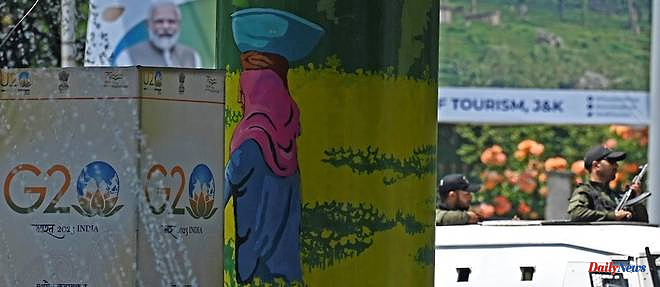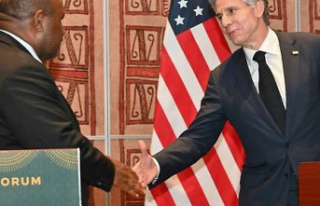A G20 meeting on tourism began Monday under tight security in Indian-administered Kashmir, whose organization in the disputed territory has been condemned by China and Pakistan.
The organization of the G20 meeting, on the shores of Dal Lake in Srinagar, should last three days.
Now India is promoting tourism in Kashmir, with its spectacular mountain scenery. Signs at the airport welcome tourists to 'heaven on earth'. More than a million Indians visited there last year.
Kashmir is divided between India and Pakistan which, since their independence in 1947, have claimed sovereignty over the entirety of this predominantly Muslim Himalayan territory. He was the cause of two of the three wars that have opposed them since.
The Indian-administered part has seen more than three decades of unrest, which has claimed tens of thousands of lives.
"Kashmir is a very peaceful destination," said Amitabh Kant, an Indian representative at the G20. "Peace, progress and prosperity are visible there".
According to Indian Minister of Science and Technology Jitendra Singh, in the past Islamabad would have called a general strike in response to an event like this G20, "and shops would be closed in Srinagar".
But today, people "go about their business", welcomed the minister at the opening of the meeting, "the man in the street of Srinagar today wants to move on. He has seen two generations lost on the altar of these incompatible eras."
Police warned last week that security had been tightened 'in vulnerable places to avoid any risk of terrorist attack during the G20 meeting', the first diplomatic event in the territory since New Delhi placed it under its control live in 2019.
According to a senior official who requested anonymity, hundreds of people have been detained in police stations and thousands more, including shopkeepers, have received calls from officials warning them against any "signs of protest or trouble".
G20 member China has warned it will not attend the event, and no delegations are expected from Turkey or Saudi Arabia.
Two ministers from the Indian government are attending, but several Western countries have only sent local diplomatic personnel.
"Does the Modi government think tourism can be promoted in closed conference halls, next to a scenic lake where marine commandos patrol and surveillance drones overhead?" interviewed journalist Bharat Bhushan in the daily Deccan Herald.
“Such stagings clearly show that the situation at J
Since the revocation of Indian Kashmir's semi-autonomy, the separatist insurgency has been largely crushed, although young men continue to join it.
The Anti-Fascist Popular Front, a separatist group that emerged in Kashmir after 2019, issued a statement on Monday condemning the meeting in Kashmir and threatening to "deploy suicide bombers". "Today, tomorrow or the day after tomorrow. It will come," he said.
On Monday, soldiers and armored vehicles were deployed across Srinagar.
But many checkpoints had been dismantled overnight and some paramilitary police, appearing to try to minimize their visibility, remained confined behind G20 billboards.
To travel to Kashmir, foreign journalists must obtain special permission from the Indian government, which they are generally refused.
But permits have been issued to the foreign press, valid only for coverage of the G20 meeting itself and limited to Srinagar.
Holders of these permits are required not to "spread anti-Indian narratives" and not to visit "terrorist-infested places without prior permission".
India holds the G20 Presidency for 2023 and has scheduled over 100 meetings in the country.
Beijing considers Kashmir a disputed territory.
Pakistan, which is not a G20 member but controls a small part of Kashmir, said hosting the meeting there violated international law, UN Security Council resolutions and bilateral agreements .
Last week, the UN special rapporteur on minority issues, Fernand de Varennes, ruled that New Delhi was "instrumentalizing" the G20 meeting by casting it as "an international stamp of approval" for a situation that " should be decried and condemned". His comments were rejected by India.
22/05/2023 18:08:37 - Srinagar (Inde) (AFP) © 2023 AFP












